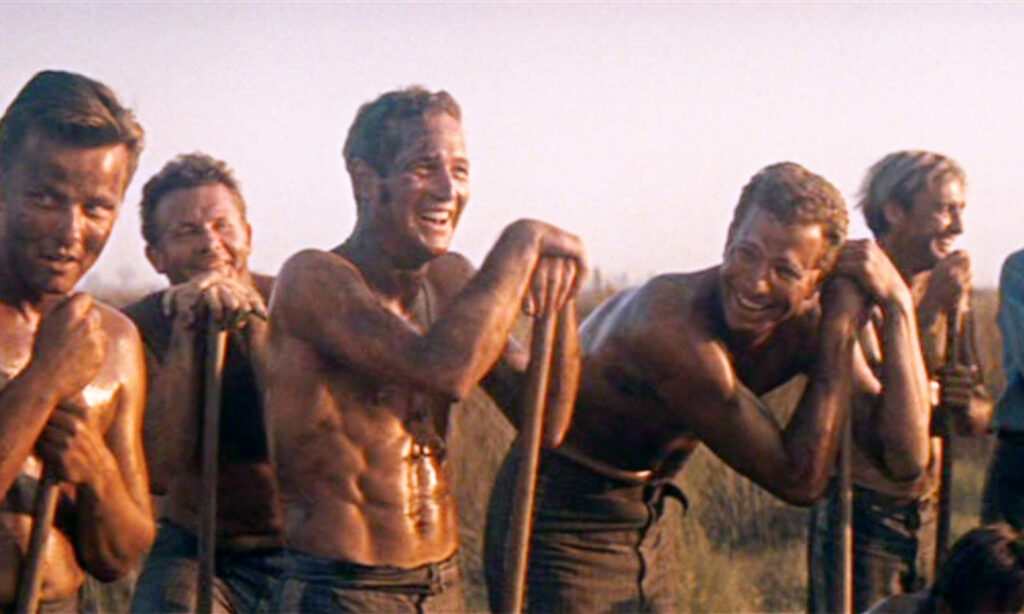The Side Pocket on the Side Street:
An Unorthodox Christ Figure in “The Hustler”
Russell Pregeant

An Unorthodox Christ Figure in “The Hustler”
by
Russell Pregeant

I expect that there are, in the minds of many Christians, few places less likely to find God than in a pool hall. But in light of the biblical theme of God’s propensity for showing up in the most unlikely ways, perhaps we shouldn’t be surprised to find some theological depth in the story of a small-time pool shark with an overgrown ego and the woman whose love his defenses won’t let him fully accept. In “The Hustler,” that woman, Sarah Parker, functions as an unorthodox Christ figure—kind and caring, but tortured and deeply broken in some respects. Crippled by polio early in life, she has faced many difficulties and has dealt with them by dulling the hurt with excessive drinking. But she becomes the means by which the life of that pool shark, or hustler, is radically changed. And since I have always found shots into the side pocket of pool tables the most difficult kind, it occurs to me that we might think of her as a kind of “side-pocket hero.”
The hustler, “Fast Eddie” Felton, is obsessed by his desire to gain the title of the best pool player in the country, and he is willing to hustle anyone on his way to the top. What he perceives as a quick route to that top is to beat Minnesota Fats, universally recognized as the best at the game. Eddie gets a shot at Fats and, in a series of games lasting all night, he is winning at one point. He is drinking heavily, however, and eventually folds. While in a depressed state, he meets Sarah, they begin a romantic relationship, and he moves in with her. But when his self-destructive behavior leads her to ask him to move out, he goes back to hustling and has a disastrous experience. Fats’s manager, Bert Gordon, arranges for some thugs to expose him as a hustler and injure him badly—breaking both his thumbs.
Sarah takes him back in, and we can now see her Christ-like character. She cares lovingly for him and finally expresses that love. The best Eddie can do, however, is to ask, “Do you need the words?” Sarah responds, “Yes. I need them very much. If you say them, I’ll never let you take them back.” Even without the words, however, Sarah maintains the relationship. But Eddie, still obsessed by his ambition, seeks out Bert Gordon for help in getting enough money to play Fats again. Against Sarah’s advice, he accompanies Bert to the Kentucky Derby, where there will be good opportunities for hustling, and he takes Sarah with him. Bert arranges a match with a rich man, and at first Eddie is losing badly. When Bert refuses to stake him anymore, he steals money from Sarah who is asleep and continues to play. When Sarah wakes up and asks Eddie to quit, he goes into a rage and tells her to get off his back. She leaves, and Eddie goes on to win enough to play Fats again.
Eddie decides to walk back to the hotel, but Bert drives there and goes to Sarah. Handing her money, which he falsely tells her is from Eddie, he says Eddie wants nothing more to do with her. He then makes sexual advances, and she, convinced that that Eddie has rejected her, finally succumbs. Later, disgusted with her self-destructive behavior, she commits suicide. When Eddie arrives and finds Sarah dead, he is so enraged at Bert that the police have to restrain him.
In the final scene, Eddie plays Fats again, with Bert present, and the match goes on late into the night, with Eddie winning. When Fats acknowledges defeat, Bert demands money from Eddie. But Eddie refuses: if he were to pay, he says, it would be as if Sarah had “never lived . . . never died. And we both know that’s not true. She lived. She died.” It is these words that signaled to me Sarah’s role as Christ-figure. It was her death, to which Eddie’s callousness had contributed, that shocks him out of his self-enclosed universe and brings him a moment of truth. Aware now of the depth of her love for him, he is faced with a choice between continuing a life of selfish ambition or opening himself up to the riskier path of genuine relationships with others.
Bert—who finally accepts Eddie’s refusal to pay him money—says that if Eddie ever enters a high-stakes pool hall again he will send thugs to give him a far worse beating than the first time. And since Eddie does not come back with a defiant answer to this threat, we can surmise that he has no intention of resuming his former life. In the vocabulary of the apostle Paul, he has died to his old self and is born to a new one (Romans 6:3-5).
Granted that Paul’s understanding of the meaning of Christ’s death can help us understand the function of Sarah’s death in this story, can Sarah’s role as a Christ-figure help us to see the life, death, and resurrection of Jesus in a different light? I believe that it does, by bringing Paul’s story of a redemptive transaction that takes place on a cosmic level down to earth. The redemption of Eddie Felson has nothing to do with the satisfaction of a moral debt created by his abusive treatment of Sarah and all those he has hustled in his life as pool shark. She does not “pay” for his sins, but her death shocks Eddie into realization of the harm he has done to her others and invites him into a different mode of existence. And this invites us to bypass what have become the dominant understandings of the atonement in a large segment of the Christian church—the satisfaction and substitution theories. If we want to find the classical theory that would best fit with the sense in which Sarah’s death was redemptive, it would be that of moral influence. For that death awakened in Eddie a recognition of the genuine love she gave him, a healthy sense of guilt for the role he played in her suicide, and a sense of obligation to honor her love by changing the way he lived. And this understanding of how a redemptive death can function on a secular level should lead us to ask whether some such understanding as this might be a better way to understand the meaning of Jesus’s death than to think that God is unable to forgive sin and work redemption without demanding some kind of payment. And if it takes an unorthodox, “side-pocket” Christ-figure in a side-street story about inhabitants of a pool hall to teach us this, then—so be it!
© Russell Pregeant

Russell Pregeant
Follow Russell on Facebook.
